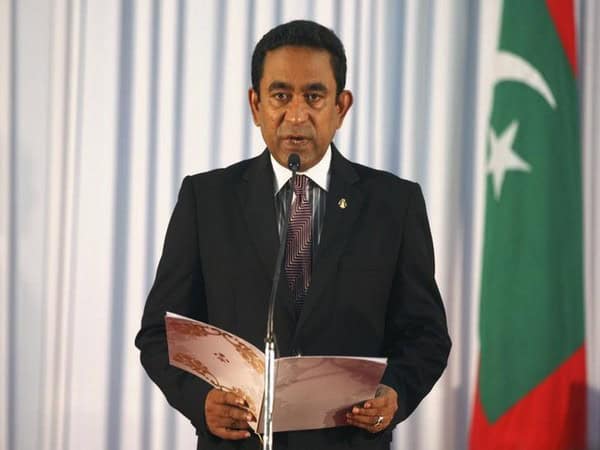Dhaka [Bangladesh]: Ever since embattled Maldivian President Abdulla Yameen imposed emergency on February 1, he has been slowly turning his country into his fiefdom.
According to Abbas Faiz, an independent South Asia analyst and senior researcher at Amnesty International, the Maldives under President Yameen is an ideal place for Beijing where Chinese President Xi Jinping, (now possibly for life) could test out his apparent plans to pressure the world into a new order shaped by China’s economic might.
Faiz stressed that China, being a dictatorship, has naturally preferred local autocrats in South Asia, offering them development incentives in place of the privileges they can return such as “the lease or freehold sale of parts of their territory to China’s massive Belt and Road Initiative (BRI).”
This has allowed local leaders to consolidate their autocratic rule in a country, while another person “supposedly” takes charge to oversee that country’s overall development.
Faiz explained that due to the so-called Look East policy, government leaders in South Asia, including the Maldives, have defied international concerns repeatedly on the suppression of democratic values and human right abuses, just like how Beijing had done for many decades.
China’s closeness to governments in the region in recent decades, from Myanmar to Sri Lanka, from Bangladesh to Nepal and the Maldives has been coupled with more repression against the opposition, less respect for the rule of law, and politicisation of independent institutions such as election commissions, anti-corruption commissions, human rights commissions, and the judicial bodies, Faiz opined.
When President Yameen took office in 2013, his initial targets were his political opponents in the Maldivian Democratic Party (MDP) led by former President Mohamed Nasheed. He then arrested his opponents and had then sentenced to long terms of imprisonment under bogus charges.
The Maldivian Supreme Court under President Yameen’s pressure blocked their release. President Yameen had “conveniently”, said that he could not intervene because the court was “independent”.
After President Yameen imposed emergency, he arrested the country’s chief justice, a supreme court judge and his own half-brother and former Maldivian President Maumoon Abdul Gayoom. Though the emergency was imposed for 15 days, it was extended to 30 days on February 5.
This was in breach of the constitution because it was passed by fewer MPs present than the required number, leading to protests by the opposition leaders.
India has been critical of the imposition of emergency in the Maldives and has expressed grave concerns on arrests of political leaders and extremely disappointed at the “delay in the resumption of the political process and the continuing suspension of the functioning of democratic institutions including the judiciary”.
However, China has steered clear of criticising President Yameen and said, “The situation in the Maldives was an internal affair of the island nation, which should be resolved by relevant parties in the Maldives through dialogue and negotiation”.
Nasheed had requested New Delhi to send its military forces to intervene and to restore democracy in the Maldives.
However, Beijing has warned that it “firmly opposes outside interference” and will “take necessary measures to stop India if New Delhi moves to intervene militarily.” This came at a time when China itself has been accused of planning to build a foreign naval base in the Maldives.
Faiz concluded that since China is a socialist dictatorship country, it cannot support Yameen for his autocratic rule and might be open to persuading him to step back. This has made New Delhi’s intentions clear and puts them in a stronger position to seek China’s agreement for respect of the rule of law and the release of political prisoners in the Maldives. (ANI)

